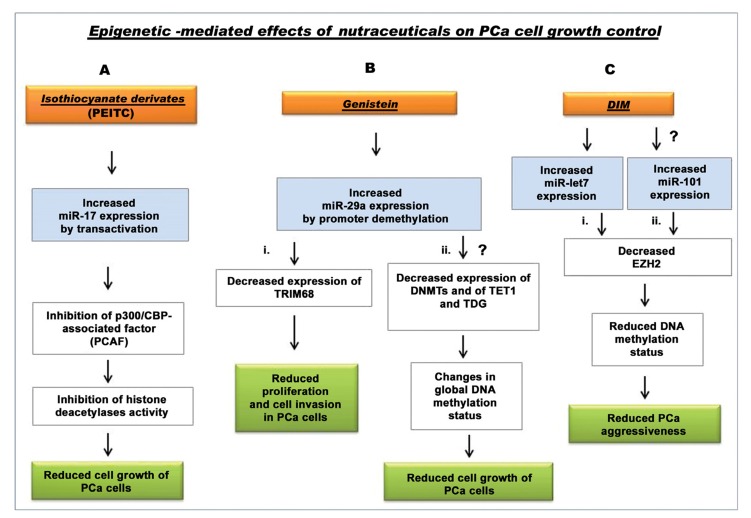Fig. (3).
Scheme of known and potential nutraceuticals targeting of miRNAs for epigenetic control of PCa. (A) The glucosinolate-derived phenethyl isothiocyanate (PEITC) may stimulate transactivation of the prostate tumor suppressor miR-17gene in LNCaP cell line. Induction of miR-17 expression inhibits PCAF factor which, in turn, inhibits HDAC activity and stimulate LNCaP cell growth [137, 153, 154]. The mechanisms of miR-17 regulation via transcriptional or epigenetic factors are still to be fully defined. (B) (i.) Genistein induces the demethylation of promoters in miRNA-29a and causes its up-regulation that leads to decrease expression of tripartite motif containing 68 (TRIM68), with a consequent inhibition of cell proliferation, migration and invasion in LNCaP, VCaP, PC-3, C4–2B and ARCaPM PCa cells. (ii.) Potential mechanism of inhibition of PCa cell growth induced by genistein involving the down-modulation of DNA-methylation status, through miR-29a up-regulation which involves DMNTs, TET and TDG inhibition. (C) (i) DIM derivatives (BR-DIM), decrease the expression of EZH2, by increasing the levels of let-7, thus contributing to cancer progression inhibition [149]. (ii) DIM could act on the epigenetic control of cancer by up-regulation of miR-101 and inhibition of EZH2 expression, thus leading to control in PCa cell growth and aggressiveness [155]. [List of abbreviations: PCa, prostate cancer; PEITC, glucosinolate-derived phenethyl isothiocyanate; p300/CBP-associated factor (PCAF), p300 and CREB binding protein (CBP) associated factor; DNMT, DNA (cytosine-5-)-methyltransferase; TRIM68, tripartite motif containing 68; TET1, methylcytosine dioxygenase 1; TDG, thymine DNA glycosylase; I3C, Indole-3-Carbinol; DIM, 3,3’- Diindolylmethane; EZH2, Enhancer of Zeste homologue 2 protein].

